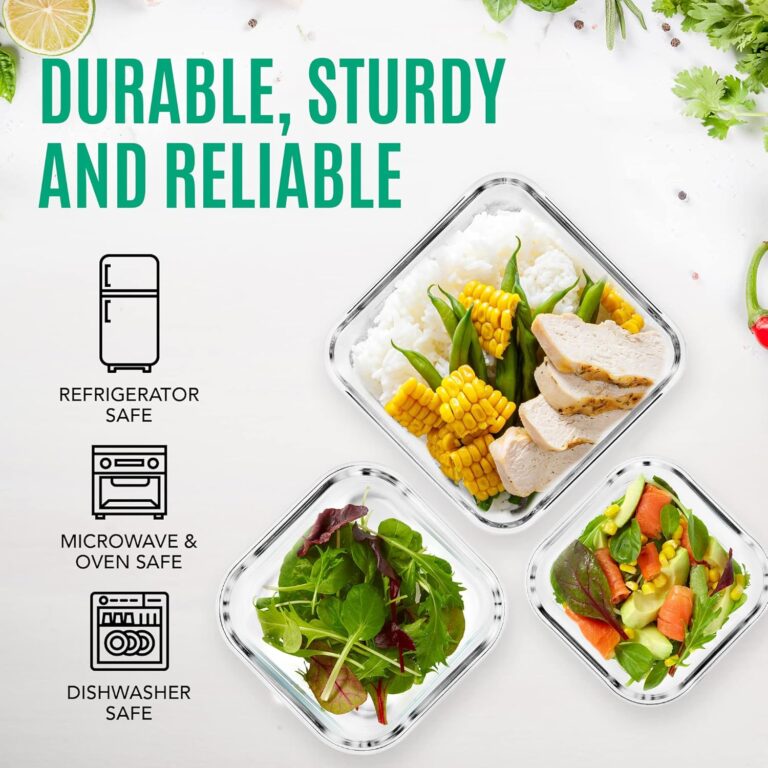
Introduction
When it comes to storing food, the debate between plastic and glass containers has been ongoing for years. But if you’re still using plastic containers, it might be time for an upgrade. Why? Glass food storage containers offer a wide range of benefits that not only make your kitchen more organized but also your life a little healthier and eco-friendlier. In this article, we’re diving into five compelling reasons why you should make the switch to glass containers. Spoiler: it’s not just about aesthetics!
What Are Glass Food Storage Containers?
Before we dig into the why, let’s take a second to understand what glass food storage containers are. Made from high-quality, often tempered, glass, these containers are use to store all kinds of foods, from leftovers to dry pantry staples. They come in a variety of sizes, with air-tight lids that help preserve your food’s freshness. Unlike their plastic counterparts, glass containers can withstand high heat, cold, and don’t leach chemicals into your food.
A Brief History of Food Storage
Food storage has evolved over the centuries. From clay pots and woven baskets to plastic tubs, humanity has always sought ways to keep food fresh for longer. But with increased awareness of health risks and environmental concerns, glass containers are making a comeback as the superior choice for modern kitchens.
Plastic vs. Glass: What’s the Difference?
While plastic has become popular due to its lightweight and inexpensive nature, it comes with several downsides. It scratches easily, absorbs odors, and contains harmful chemicals like BPA. On the flip side, glass is naturally free from these issues and can be use over and over without showing signs of wear.
Reason 1: Durability
Glass containers are incredibly durable. Contrary to popular belief, they aren’t fragile and easily broken. Most glass containers used for food storage today made from tempered glass, which is designed to resist shattering when dropped from a reasonable height.
Shatterproof Myths Debunked
While no material is completely shatterproof, tempered glass is about as tough as it gets for household use. It can handle both everyday use and sudden temperature changes, making it perfect for storing food in the fridge, freezer, or even oven.
Longevity of Glass Containers
One of the best features of glass containers is their longevity. Plastic containers warp, discolor, and degrade over time, but glass holds its own. A good set of glass containers can last you for decades with proper care.
Reason 2: Non-Toxic and Safe for Health
We all want to make healthier choices, right? Well, glass containers are a simple switch that can make a big difference. Unlike plastic, glass doesn’t contain harmful chemicals that can leach into your food.
Harmful Chemicals in Plastics
Many plastic containers contain chemicals like BPA, phthalates, and other additives that can migrate into food, especially when heated. These chemicals link to various health issues, including hormonal disruption and cancer.
Glass and Its Natural Composition
Glass, on the other hand, made from natural materials like sand and limestone. It’s non-porous, which means it won’t absorb flavors, odors, or chemicals, ensuring that your food stays fresh and safe to eat.
Reason 3: Better for the Environment
Plastic pollution is a global crisis, and switching to glass can help reduce your environmental footprint. Glass is 100% recyclable and can recycle endlessly without loss of quality.
The Environmental Impact of Plastic
Plastic containers contribute to landfills and ocean pollution. In fact, estimated that over 8 million tons of plastic end up in the ocean each year. Choosing glass means you’re opting for a material that doesn’t contribute to this growing problem.
How Glass Reduces Waste
Glass containers designed to last, meaning fewer replacements and less waste overall. Plus, you can repurpose glass jars and containers for other household uses once they’ve served their time in your kitchen.
Reason 4: Versatility and Style
Who knew food storage could be stylish? Glass containers are not only functional but also look great on your kitchen counter or in your fridge.
Microwave, Frees Add Aesthetic Appeal
From sleek mason jars to modern minimalist designs, glass food storage containers come in a variety of styles that add a touch of elegance to your kitchen. They look great whether you’re meal prepping, organizing your pantry, or serving food directly at the table.
Reason 5: Preserves Food Quality
Nobody likes soggy leftovers or food that has absorbed the smell of last night’s dinner. Glass containers keep your food fresh and flavorful.
How Gltion of Odor and Stains
Unlike plastic, which tends to absorb strong smells and stains, glass containers are resistant to both. Whether you’re storing curry, pasta sauce, or onions, glass won’t retain those lingering odors, keeping your food and containers fresh.
Conclusion
So, there you have it – five excellent reasons why you should switch to glass food storage containers. They’re durable, non-toxic, environmentally friendly, versatile, and they keep your food fresher for longer. Plus, they look great in your kitchen! It’s a win-win all around. Whether you’re trying to lead a healthier lifestyle, reduce your environmental footprint, or just add a little style to your storage game, glass containers are the way to go.
Read more: Click here
FAQs
Q: Can glass containers go directly from the fridge to the oven?
Yes! Just make sure the glass is oven-safe and allow it to come to room temperature if you’ve just taken it out of the fridge to avoid thermal shock.
Q: Is it safe to microwave glass containers?
Yes, you can microwave food in glass containers. Just ensure the lids are microwave-safe or remove them during heating.
Q: Do glass containers help with meal prepping?
Yes, glass containers are perfect for meal prepping. They’re easy to label, stack, and store in the fridge or freezer.
Q: Are glass containers expensive compare to plastic?
Glass containers might be more expensive upfront, but they last much longer, making them a worthwhile investment in the long run.